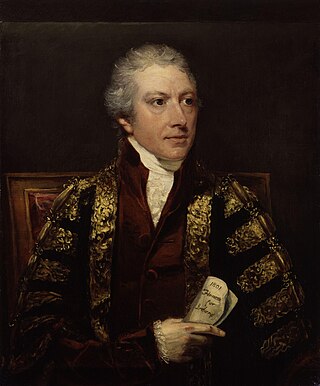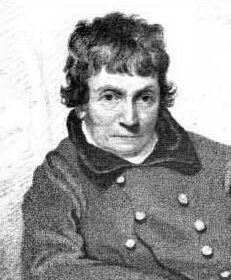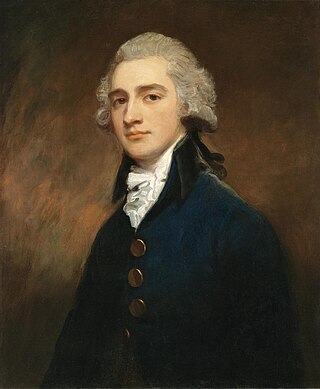Related Research Articles

Jeremy Bentham was an English philosopher, jurist, and social reformer regarded as the founder of modern utilitarianism.

Edmund Cartwright was an English inventor. He graduated from Oxford University and went on to invent the power loom. Married to local Elizabeth McMac at 19, he was the brother of Major John Cartwright, a political reformer and radical, and George Cartwright, explorer of Labrador.

Charles Abbot, 1st Baron Colchester PC, FRS was a British barrister and statesman. He served as Speaker of the House of Commons between 1802 and 1817.
Wolseley may refer to:

Field Marshal Garnet Joseph Wolseley, 1st Viscount Wolseley,, was an Anglo-Irish officer in the British Army. He became one of the most influential and admired British generals after a series of successes in Canada, West Africa and Egypt, followed by a central role in modernizing the British Army in promoting efficiency.

Sir Samuel Romilly, was a British lawyer, politician and legal reformer. From a background in the commercial world, he became well-connected, and rose to public office and a prominent position in Parliament. After an early interest in radical politics, he built a career in chancery cases, and then turned to amelioration of the British criminal law.

Sir Francis Burdett, 5th Baronet was a British politician and Member of Parliament who gained notoriety as a proponent of universal male suffrage, equal electoral districts, vote by ballot, and annual parliaments. His commitment to reform resulted in legal proceedings and brief confinement to the Tower of London. In his later years he appeared reconciled to the very limited provisions of the 1832 Reform Act. He was the godfather of Francisco Burdett O'Connor, one of the famed Libertadores of the Spanish American wars of independence.

John Cartwright was an English naval officer, Nottinghamshire militia major and prominent campaigner for parliamentary reform. He subsequently became known as the Father of Reform. His younger brother Edmund Cartwright became famous as the inventor of the power loom.
Three baronetcies were created for persons with the surname D'Oyly, two in the Baronetage of England and one in the Baronetage of the United Kingdom. One creation is extant as of 2008.
Sir Charles Wolseley, 2nd Baronet, of Wolseley in Staffordshire, was an English politician who sat in the House of Commons at various times between 1653 and 1660. He held high office during the Commonwealth.
There have been two baronetcies created for members of the Wolseley family, one in the Baronetage of England and one in the Baronetage of Ireland. As of 2018, the Wolseley Baronetcy of Mount Wolseley is dormant.
Charles Warren was an English barrister and politician, judge and amateur cricketer.
James Humphreys was a Welsh barrister, law reformer and legal writer. He was educated at Shrewsbury School and called to the bar in 1800 by Lincoln's Inn. Politically he was a liberal. His major publication in the field of law reform was Observations on the Actual State of the English Laws of Real Property, with the outlines of a Code (1826).

Sir Henry Marsh, 1st Baronet was an Irish physician and surgeon. He was born in Loughrea, County Galway in Ireland. He was one of the medical doctors associated with Basedow's syndrome, which is also known as Marsh's disease and currently as Graves' disease.

Sir Matthew Wood, 1st Baronet was a British Whig politician, Lord Mayor of London from 1815 to 1817, and from 1817 until his death in 1843 a reformist Member of Parliament.

Thomas Crew, 2nd Baron Crew of Steane, Northamptonshire was an English politician who sat in the House of Commons at various times between 1654 and 1679, when he inherited the peerage Baron Crew.

Lieutenant-General Sir George Benjamin Wolseley was an Anglo-Irish officer in the Indian Army.

Sir George Gunning, 2nd Baronet (1763–1823), of Horton, Northamptonshire, was an English politician.

Wolseley Hall was a stately home near the village of Colwich, in Staffordshire, England. It was demolished in 1966; the former gardens are now a nature reserve of the Wolseley Centre.
George Peter Holford (1767–1839) was an English barrister, politician and author. With a short break 1806–7, he was a Tory Member of Parliament from 1803 to 1826, for a number of constituencies. Holford was an advocate of prison reform.
References
- ↑ "Sir Charles Wolseley, 7th Baronet. Collections Online | British Museum". www.britishmuseum.org. Retrieved 24 February 2023.
- ↑ Spence, Peter. "Wolseley, Sir Charles". Oxford Dictionary of National Biography (online ed.). Oxford University Press. doi:10.1093/ref:odnb/29850.(Subscription or UK public library membership required.)
- ↑ Bentham, Jeremy (1843). The Works of Jeremy Bentham: Memoirs of Bentham. London: W. Tait. pp. 522–523.